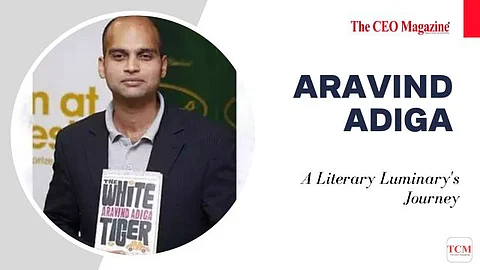
- News
- Women
- Magazine
- IndustryIndustry
- InsightsInsights
- Success Stories
- PublishPublish
- ContactContact
- Media KitMedia Kit

Aravind Adiga
A Literary Luminary's Journey
Aravind Adiga, a prominent Indian writer and journalist, has carved a niche for himself in the literary world with his thought-provoking novels and insightful commentary on contemporary India. Born on October 23, 1974, in Madras (now Chennai), his journey from a young writer to a Man Booker Prize-winning author is an inspiring narrative.
Adiga hails from a family with notable connections in Karnataka. His paternal grandfather, K. Suryanarayana Adiga, served as the chairman of Karnataka Bank, and his maternal great-grandfather, U. Rama Rao, was a renowned medical practitioner and Congress politician in Madras.
Aravind Adiga's early years were spent in Mangalore, where he attended Canara High School and St. Aloysius College. It was at St. Aloysius College that he completed his SSLC in 1990.
However, Adiga's academic journey took him far from the shores of India. After emigrating to Sydney with his family, he attended James Ruse Agricultural High School and later pursued English literature at Columbia College of Columbia University in New York City.
Under the mentorship of the eminent historian Simon Schama, Adiga graduated as the salutatorian in 1997. He also enriched his academic repertoire with a stint at Magdalen College, Oxford, where he had the privilege of being taught by Hermione Lee.
Aravind Adiga's career began in the world of financial journalism, where he honed his writing skills. His internship at the Financial Times allowed him to delve into the complexities of the stock market and investment, providing a solid foundation for his future endeavours.
His incisive analysis also led to him interviewing notable figures, including the former U.S. President Donald Trump. He later contributed pieces to Money and other publications.
Adiga's reputation as a journalist grew when he worked as a South Asia correspondent for Time magazine. During his three-year tenure, he covered a wide range of topics, including politics, economics, and societal issues. However, his journey as a writer was destined to take a different path.
Aravind Adiga's life took a momentous turn with the publication of his debut novel, "The White Tiger." The novel, a searing exploration of the socio-economic disparities in modern India, won the prestigious Man Booker Prize in 2008.
It was a groundbreaking moment in Adiga's career, making him the fourth Indian-born author to receive this esteemed award, following luminaries like Salman Rushdie, Arundhati Roy, and Kiran Desai.
"The White Tiger" captivated readers and critics alike with its stark portrayal of Balram, the protagonist who rises from abject poverty to wealth. Adiga's work starkly illuminated the stark contrast between India's economic boom and the harsh realities faced by those on the fringes of society.
Adiga's writing, in his words, aimed to "highlight the brutal injustices of society," akin to the literary giants of the 19th century like Flaubert, Balzac, and Dickens, who aimed to bring about positive change through their critique.
The success of "The White Tiger" spurred the adaptation of the novel into a feature film, further amplifying the impact of this powerful narrative. The novel's Indian edition achieved remarkable sales figures, exceeding 200,000 copies.
Adiga's "The White Tiger" has been dissected and analysed academically as a first-person Bildungsroman, offering a unique perspective on contemporary Indian writing in English. Critics have praised the novel for its portrayal of both the "Darkness" reminiscent of Dickens's London and the meteoric ascent of its central character.
Some have noted an element of artificiality, cleverly veiled by irony, in the narrative, emphasising the presence of an "inauthentic voice" within the title character.
One interesting aspect of Adiga's work is its ability to challenge stereotypes and reveal the complexities of contemporary India. As one Pakistani blogger noted, "The White Tiger" acted as an eye-opener, shedding light on the "dark secrets" of India, breaking down preconceived notions and revealing startling similarities with the blogger's own country, Pakistan.
Beyond "The White Tiger," Adiga has continued to contribute to contemporary Indian literature with works like "Between the Assassinations," "Last Man in Tower," "Selection Day," and "Amnesty." These novels further showcase his literary prowess, reflecting his deep understanding of Indian society and its challenges.
Aravind Adiga's bibliography includes the following works:
"The White Tiger: A Novel" (2008)
"Between the Assassinations" (2008)
"Last Man in Tower" (2011)
"Selection Day" (2016)
"Amnesty" (2020)
In addition to his novels, Adiga has also dabbled in short stories, some of which have been published in prestigious publications such as The Guardian, The Sunday Times, The Times, and The New Yorker.
Aravind Adiga's impact on contemporary Indian literature is undeniable. His powerful narratives, keen observations, and insightful critiques of societal inequalities continue to engage readers, challenge stereotypes, and prompt important discussions.
Adiga's journey from financial journalist to celebrated author is a testament to the transformative power of storytelling. His creations stand as a constant reflection of the complex fabric that defines contemporary India.
Follow us on Google News
